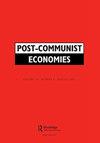The impact of new actors in global environmental politics: the European Bank for Reconstruction and Development meets China
IF 1.8
3区 经济学
Q2 ECONOMICS
引用次数: 15
Abstract
ABSTRACT Since its inception in 1991, the EBRD has had a strong environmental agenda, which it ‘exported’ to post-Communist Europe and Asia. We posit that the post-Soviet states have decreased their carbon emissions more than the average states borrowing from the EBRD as they were more affected by the economic crisis associated with the end of the Soviet Union. However, the post-Soviet states have also been approached by China through a number of regional initiatives launched across Eurasia. Therefore, we further hypothesise that states borrowing from the EBRD that have been aligned with China have higher carbon emissions. We employ a sample of 32 states that borrowed from the EBRD between 1991 and 2015. Through panel-data linear regressions with heteroscedasticity-corrected robust standard errors, we corroborate our hypotheses. This study contributes to a better understanding of new actors in global environmental politics and their role in sustainable development in Eurasia and beyond.全球环境政治中新参与者的影响:欧洲复兴开发银行与中国会面
自1991年成立以来,欧洲复兴开发银行一直有一个强有力的环境议程,并将其“输出”到后共产主义时代的欧洲和亚洲。我们假设后苏联国家比从欧洲复兴开发银行借款的平均国家减少了更多的碳排放,因为它们受到与苏联解体相关的经济危机的影响更大。然而,中国也通过在欧亚大陆发起的一系列区域倡议与后苏联国家进行了接触。因此,我们进一步假设,从欧洲复兴开发银行借款的与中国结盟的国家碳排放量更高。我们选取了在1991年至2015年间从欧洲复兴开发银行借款的32个国家作为样本。通过具有异方差校正的稳健标准误差的面板数据线性回归,我们证实了我们的假设。这项研究有助于更好地理解全球环境政治中的新参与者及其在欧亚大陆及其他地区可持续发展中的作用。
本文章由计算机程序翻译,如有差异,请以英文原文为准。
求助全文
约1分钟内获得全文
求助全文
来源期刊

Post-Communist Economies
ECONOMICS-
CiteScore
4.90
自引率
18.20%
发文量
21
期刊介绍:
Post-Communist Economies publishes key research and policy articles in the analysis of post-communist economies. The basic transformation in the past two decades through stabilisation, liberalisation and privatisation has been completed in virtually all of the former communist countries, but despite the dramatic changes that have taken place, the post-communist economies still form a clearly identifiable group, distinguished by the impact of the years of communist rule. Post-communist economies still present distinctive problems that make them a particular focus of research.
 求助内容:
求助内容: 应助结果提醒方式:
应助结果提醒方式:


